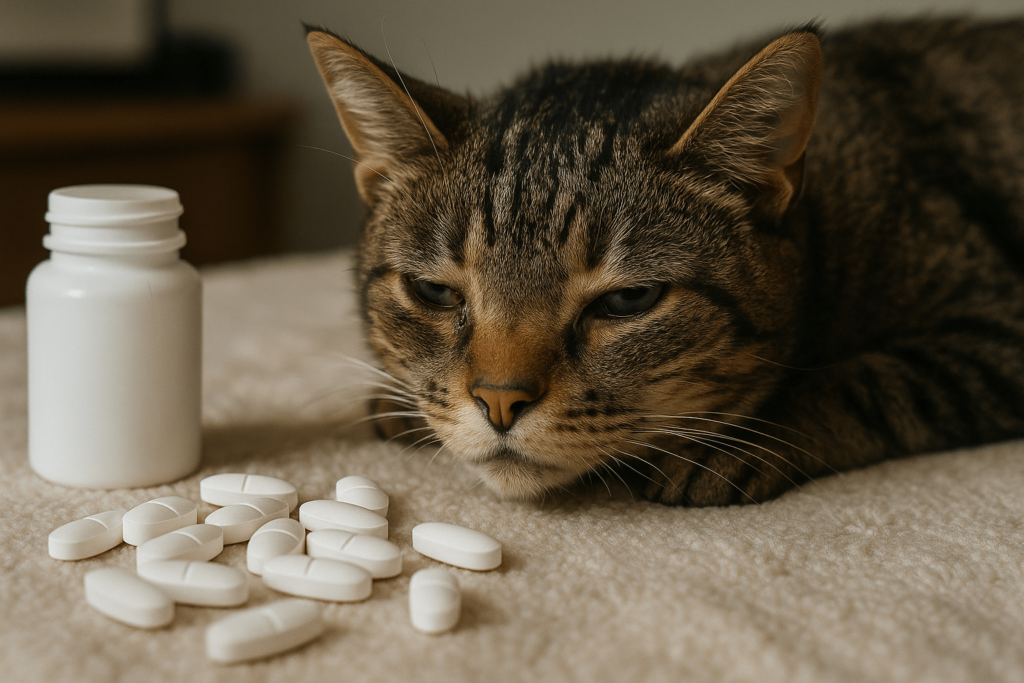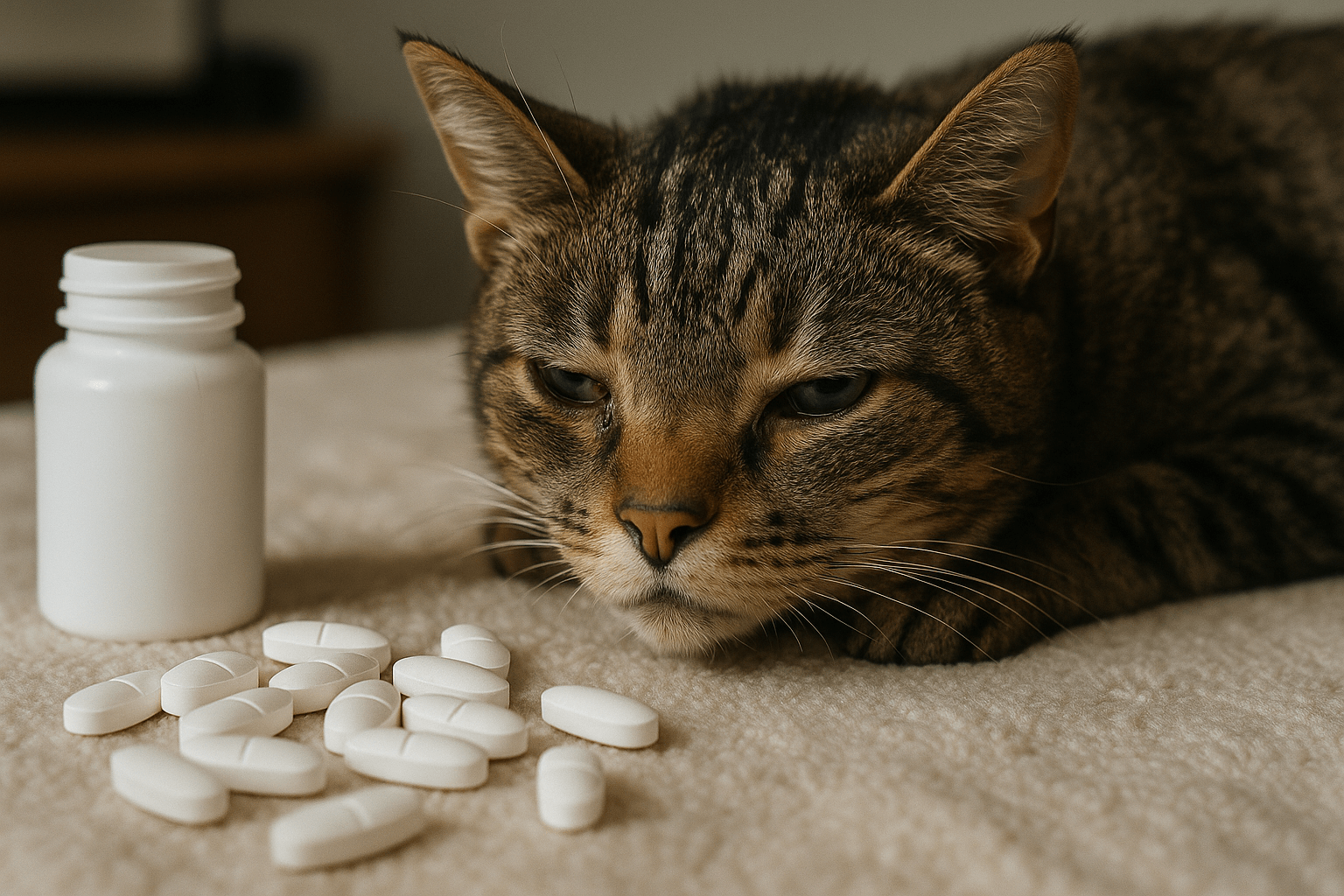Acetaminophen Toxicity in Cats: A Silent, Deadly Threat
Cats are meticulous, independent, and surprisingly vulnerable. One of the most dangerous household hazards for your feline isn’t a plant, a wire, or even a window—it’s a common pain reliever you likely keep in your medicine cabinet. Acetaminophen, the active ingredient in Tylenol and dozens of over-the-counter medications, is lethally toxic to cats. Even a single tablet can be fatal. Understanding acetaminophen toxicity in cats isn’t just important—it’s a matter of life and death.
Why Acetaminophen Is So Deadly to Cats
Cats don’t metabolize drugs the way humans or even dogs do. Their bodies lack the enzymes needed to safely process acetaminophen, turning it into a potent toxin. Here’s what happens inside their system:
Lack of Glucuronidation Pathway:
Cats are missing a critical liver enzyme that breaks down acetaminophen safely—making them uniquely susceptible to poisoning.Rapid Oxidation to Toxic Metabolites:
Instead of being detoxified, acetaminophen is converted into NAPQI, a compound that destroys red blood cells and liver tissue.Methemoglobinemia Risk:
Toxic metabolites bind to hemoglobin, reducing oxygen delivery to tissues—causing blue-tinged gums, weakness, and suffocation.Liver Failure:
The liver becomes overwhelmed, leading to massive cell death, jaundice, and internal bleeding.Rapid Onset of Symptoms:
Signs can appear within 1–4 hours, and death can occur within 24–72 hours if untreated.
This isn’t an allergy or sensitivity—it’s a biological impossibility. There is no safe dose for cats. Ever.

Common Ways Cats Are Exposed to Acetaminophen
Most cases of acetaminophen poisoning are accidental. Owners don’t intend harm—but the consequences are devastating. Here’s how exposure typically happens:
Medication Mistake:
A cat is given “just a little” Tylenol because the owner thinks it’s safe—like for humans.Unattended Pills:
A dropped tablet, open bottle, or pill on a nightstand is easily licked up by a curious cat.Shared Human Food:
Some medications are hidden in treats or food, and cats may consume them unknowingly.Secondhand Exposure:
Cats may lick residue from a human’s skin or fur after handling pills or applying topical products.Misguided “Home Remedy”:
Some owners, desperate to help a sick cat, turn to human medicine without consulting a vet.
These aren’t rare tragedies. Acetaminophen toxicity is one of the most common causes of accidental poisoning in cats—and nearly all cases are preventable.
Check this guide 👉Methimazole for Cats: Best 7 Expert Tips!
Check this guide 👉Bravecto for Cats: Best 7 Expert Tips!
Check this guide 👉Understanding Meloxicam for Cats: Best 7 Expert Tips!
| Symptom Category | Specific Signs to Watch For |
|---|---|
| Early Signs (1–4 hours) | Lethargy, vomiting, drooling, rapid breathing |
| Intermediate Signs (6–12 hours) | Blue or brown gums (cyanosis), swelling of face/paws, dark urine |
| Advanced Signs (12–24 hours) | Difficulty breathing, jaundice (yellow eyes/skin), seizures, coma |
| Organ Failure Signs | Abdominal pain, uncontrolled bleeding, low body temperature, collapse |
| Late-Stage Indicators | No response to stimuli, irregular heartbeat, death |
The Immediate Actions You Must Take If You Suspect Poisoning
Time is the most critical factor. Every minute counts. If you believe your cat has ingested acetaminophen, act immediately—do not wait for symptoms.
Do Not Induce Vomiting at Home:
This can cause aspiration or further harm. Only trained professionals should attempt it.Call Your Veterinarian or Emergency Clinic Immediately:
Even if your cat seems fine. Tell them the exact substance, estimated dose, and time of ingestion.Bring the Medication Packaging:
This helps the vet identify the concentration and any other ingredients (like caffeine or pseudoephedrine) that may worsen toxicity.Do Not Delay for “Just One More Hour”:
The window for effective treatment is narrow. Delaying can mean the difference between survival and death.Prepare for Hospitalization:
Treatment often requires 24–72 hours of intensive care, including IV fluids, oxygen, and antidotes.
Your quick response can save your cat’s life. Don’t second-guess. Don’t hope. Act.
How Veterinarians Treat Acetaminophen Toxicity
Treatment is aggressive, expensive, and time-sensitive—but it can be successful if started early. Here’s what to expect:
Decontamination:
If ingestion was recent (under 1–2 hours), the vet may induce vomiting or perform gastric lavage.Antidote Administration:
N-acetylcysteine (NAC) is the primary antidote—it helps replenish glutathione and neutralize toxic metabolites.IV Fluid Therapy:
Supports kidney function, flushes toxins, and maintains hydration during metabolic crisis.Oxygen Therapy:
For cats with methemoglobinemia, supplemental oxygen is life-saving to combat tissue hypoxia.Blood Transfusions:
In severe cases, red blood cell destruction may require transfusions to restore oxygen-carrying capacity.Liver Support Medications:
S-adenosylmethionine (SAMe) and milk thistle extract help protect and regenerate liver cells.
Even with full treatment, survival is not guaranteed. But without it, the prognosis is nearly always fatal.
Why There Is No “Safe” Dose for Cats
Many people believe “a tiny amount” won’t hurt. That belief is deadly wrong. Here’s why:
A Single 500mg Tablet Is Lethal:
The toxic dose for cats is as low as 10mg per kg of body weight. A 10-lb cat can die from half a 325mg tablet.No Species-Specific Formulation Exists:
Unlike dogs, cats have no approved acetaminophen formulations. It is never prescribed by veterinarians.Symptoms Are Silent Until It’s Too Late:
Cats show no outward signs until organ damage is advanced. By then, reversal is often impossible.Over-the-Counter ≠ Safe for Pets:
Just because it’s sold in pharmacies doesn’t mean it’s safe for animals. Many human medications are deadly to cats.Even Topical Exposure Can Be Harmful:
Cats licking residue from a human’s skin after applying pain-relief gel can absorb enough to poison them.
There is no safe amount. Not one drop. Not one crumb. Never.
How to Prevent Acetaminophen Poisoning in Your Home
Prevention is the only truly effective treatment. These steps create a zero-risk environment for your cat:
Lock All Medications in a Secure Cabinet:
Use childproof locks or a locked box. Cats are expert climbers and explorers.Never Give Human Medication Without Vet Approval:
Even if it worked for your dog or your child—it is not safe for your cat.Dispose of Pills Properly:
Don’t flush them. Don’t leave them in trash bins. Seal them in a container and discard securely.Be Aware of Hidden Sources:
Cold medicines, migraine pills, and combination products often contain acetaminophen. Read labels.Educate Everyone in the Household:
Children, guests, and caregivers must understand: “No human medicine for cats—ever.”
One moment of carelessness can end a life. Make your home a sanctuary—not a minefield.
FAQ: Acetaminophen Toxicity in Cats
Can my cat die from licking a pill off the floor?
Yes. Even a small amount of residue can contain a lethal dose. Immediate veterinary care is essential.
Is Tylenol for cats ever safe?
No. There is no approved acetaminophen product for cats. Any use is off-label and extremely dangerous.
What if my cat only licked a tiny bit of a pill?
It doesn’t matter. The margin between a toxic and lethal dose is razor-thin. Seek help immediately.
Can I use activated charcoal at home?
No. Activated charcoal is not effective for acetaminophen and can cause aspiration. Only professionals should administer it.
How long does it take for symptoms to appear?
As early as 1 hour, but usually within 2–4 hours. Don’t wait for visible signs—act at the first suspicion.
Protecting Your Cat Means Knowing What to Keep Away
Cats don’t understand medicine. They don’t know the difference between a lifesaving pill and a poison. They trust you. They curl up beside you when you’re sick. They nudge your hand when you reach for the bottle.
And that’s why you must be their guardian—not just their caregiver.
Acetaminophen toxicity in cats is not a myth. It’s a daily reality for too many families who thought they were helping.
Canned Pumpkin for Cat Diarrhea: Best 7 Expert Tips! Natural remedy to firm stools, soothe upset bellies, and support gut health safely.
Can a Cat Give You Scabies? Best 7 Expert Tips! Discover the truth about feline mites, human skin risks, and how to protect yourself—without panic.
Cat Flea vs Human Flea: Best 7 Expert Tips! Discover the truth about bites, species, and how to eliminate infestations for good.
Weird Cat Behaviors: Best 7 Expert Tips! Discover why cats do strange things—and how to understand, not punish, their instincts for a happier home.





